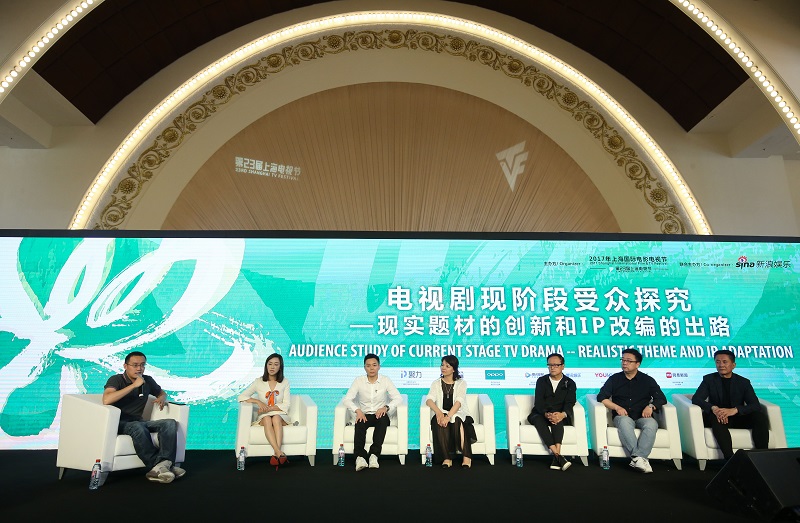Forum weighs up merits of genres and audience appeal
By Liza Li(Shanghai Daily)
Major TV dramas adapted from high profile IPs like “The Journey of Flower” and “Nirvana in Fire” became a strong phenomena in the Chinese television industry in 2015 but the trend didn\'t last, a forum heard at the ongoing 23rd Shanghai TV Festival yesterday.
When the market swarmed into developing more IP-based historical TV dramas in 2016 to recreate the success, a lot of highly anticipated series didn’t grab as much attention, such as “Ice Fantasy” and “The Legend of Chusen.”
Content creators used to assert that realistic themes weren\'t appealing to young audiences who preferred costume dramas and fantasy stories, but the hottest TV drama in 2017, “In the Name of People,” proved the opposite.
The STV Forum on audience study of TV drama invited producers and actors to discuss the connection between genre and audience composition as well as the importance of creating solid, high quality content.
Tang Lijun, founder and CEO of New iPicture Media (Shanghai), noted there is a change in the identity recognition of audiences that today are considered participants who can decide the good and bad aspects of a TV drama.
Liu Yijun, an actor in blockbuster TV dramas like “Nirvana in Fire” and “The Disguiser,” said there was no obvious difference between realistic themes and IP adaptations.
“The most important thing is to touch the audience with every story and character. There’s no need to separate the audiences for realistically themed TV dramas and IP adaptations,” he said.
Zhang Zhijian, who played Gao Yuliang in “In the Name of People,” said a big IP plus actors with high "buzz volume" in the media do not equate to high quality TV drama.
Director and producer Chiang KarChun said that old IP-based costume dramas had very lively stories and characters that audiences could relate to.
“I think historical IP dramas have a long future. We hope more producers can support the directors’ ideas and give them more time to develop a good project instead of just money,” he said.
In content creation, a good story with excellent characters is seen as the key, while expressing a positive vibe is also important.
“We hope TV dramas can give audiences more motivation and inspiration, whether in emotional life or career,” said Fang Ying, vice president of Croton Media and general manager of GCOO Entertainment.
Tang Lijun added the production cycle is also an issue in making high quality TV dramas and it’s important to find a younger voice to express positive values and dreams. If a realistically themed script takes seven or eight years to finish, it’s going to be out of date, so in-depth and practical research is a must, she said.
Young actors and actresses who have high "buzz volume" in the media and on social media platforms are claiming sky-high paybacks because they can bring the traffic needed by the TV dramas instead of quality acting, Tang added.
And web-based series have also given young actors and actresses more opportunities, but China has a higher proportion of higher paid actors.
“This phenomenon reflects China’s fast-growing film and TV industry," Tang said. "It’s also the result of capital flowing into a market which is already making adjustments and some highly paid actors might fall in the future.”
Director and producer Chiang said he’s not against having more high paid actors but hopes their performances can match their pay and improve the quality of series.

Zhang Zhijian, who played Gao Yuliang in “In the Name of People,” said a big IP plus actors with high "buzz volume" in the media do not equate to high quality TV drama. Pic by CFP

The STV Forum on audience study of TV drama invited producers and actors to discuss the connection between genre and audience composition as well as the importance of creating solid, high quality content. Pic by CFP



